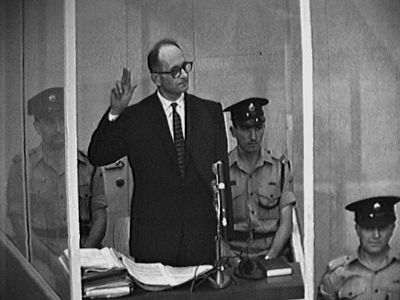
The Eichmann Trial: JIFF2025
Click here if you liked this article 5 ![]()
https://www.jiff.com.au/films/the-eichmann-trial
Date Reviewed: 27/10/2025
The Eichmann Trial is an historical documentary that follows the Adolf Eichmann trial held in Jerusalem in 1961.
Adolf Eichmann was a high-ranking Nazi officer who played a pivotal role in the organization and execution of the the Holocaust in World War II. He was responsible for facilitating and managing the mass deportation of Jews to extermination camps. Eichmann was captured by Allied forces in 1945, but he fled Europe and lived in Argentina under a false identity until he was captured by Israeli agents in 1960.
The trial created great interest all over the world and journalists from many countries were present to hear the 25 counts for which Eichmann was accused including crimes against humanity, war crimes and crimes against the Jewish people. This trial was one of the first to be publicly broadcast, bringing evidence of the Holocaust to a worldwide audience.
There were 110 witnesses testifying, creating 13,000 pages of transcript over approximately 8 months. The witnesses were largely survivors of the Holocaust, but there were also Nazi officials and collaborators, historians and researchers, and experts, and witnesses who testified about the documentary evidence, including Nazi records.
The outcome of the trial was that Eichmann was found guilty on most charges and was sentenced to death. He was executed by hanging in June 1962, marking the first and only civil execution in Israel.
The film itself, directed and edited by Elliot Levitt, pulls no punches, and we are subjected to witness after witness breaking down, one collapsing and having to be removed from the court on a stretcher.
There are also graphic photographs of the atrocities carried out in the camps and the mass burials, while all the time Eichmann is sitting in his bullet-proof glass witness box with guards, stoically passive, not showing emotion, and making notes for a guard to give to his lawyer.
It is a hard film to watch on many counts. The figures and images presented are confronting, but not as confronting as the survivor testimonies, particularly from one survivor who had to choose between his wife and mother being taken to a concentration camp with him and therefore having a chance of survival.
The core of the film is Eichmann’s own testimony, which centres on the premise that he was just carrying out the orders given to him and the officials giving the orders are the criminals. Eichmann is firm and resolute during his testimony and cross-interrogation, but near the end of the trial, you can see the ‘cracks showing’ in his outward persona.
The use of archival footage only is a wise choice as there can be no skewing of the truth, and the black and white grainy footage adds authenticity to this lengthy documentary.
The outcome of this trial has helped shape the memory of the Holocaust, influenced international law regarding war crimes, and stressed the importance of accountability. It is riveting viewing, if not horrific, and I have to confess to being exhausted emotionally at the end of the film. One wonders how there can still be deniers of this catastrophic event.
The Eichmann Trial is a reminder of an event in history that still has ramifications today, and a reminder that we must never let such an atrocity happen again!
Reviewed by Barry Hill OAM